Qianliyan is a Chinese sea and door god.
Qianliyan may also refer to:
- Qianliyan Island, an island off Qingdao, Shandong, China
- Mount Qianliyan, a mountain on Taiwan Island
Qianliyan is a Chinese sea and door god.
Qianliyan may also refer to:
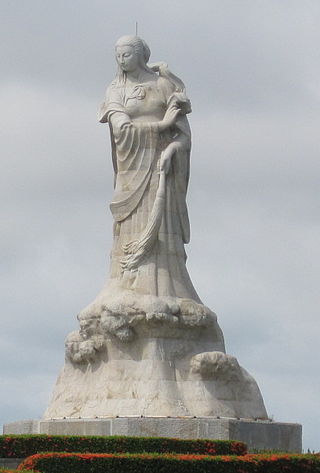
Mazu or Matsu is a Chinese sea goddess also known by several other names and titles. Mazu is the deified form of Lin Moniang, a shamaness from Fujian who is said to have lived in the late 10th century. After her death, she became revered as a tutelary deity of Chinese seafarers, including fishermen and sailors. Her worship spread throughout China's coastal regions and overseas Chinese communities throughout Southeast Asia, where some Mazuist temples are affiliated with famous Taiwanese temples. Mazu was traditionally thought to roam the seas, protecting her believers through miraculous interventions. She is now generally regarded by her believers as a powerful and benevolent Queen of Heaven.
Ping may refer to:
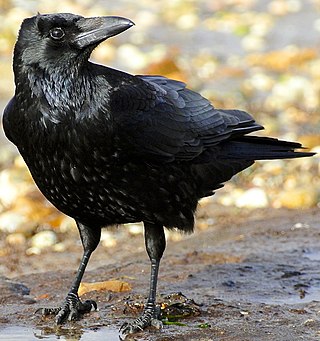
A crow is a bird of the genus Corvus, or more broadly a synonym for all of Corvus. The word "crow" is used as part of the common name of many species. The related term "raven" is not linked scientifically to any certain trait, but is rather a general grouping for larger species of Corvus.

Menshen or door gods are divine guardians of doors and gates in Chinese folk religions, used to protect against evil influences or to encourage the entrance of positive ones. They began as the divine pair Shenshu and Yulü under the Han, but the deified generals Qin Shubao and Yuchi Gong have been more popular since the Tang. In cases where a door god is affixed to a single door, Wei Zheng or Zhong Kui is commonly used.
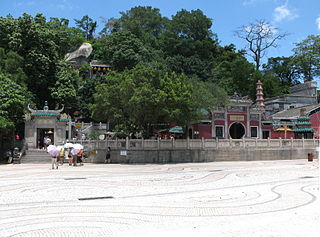
The A-Ma Temple is a temple to the Chinese sea-goddess Mazu located in São Lourenço, Macau, China. Built in 1488, the temple is one of the oldest in Macau and thought to be the settlement's namesake.
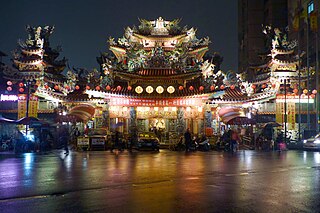
Ciyou Temple is a prominent Chinese temple in Songshan District, Taipei, Taiwan. The temple is dedicated to the Goddess Matsu. Raohe Street Night Market was located next to this temple as the temple has been a prominent landmark in the area.

Tin Hau temples in Hong Kong are dedicated to Tin Hau (Mazu). Over 100 temples are dedicated to Tin Hau in Hong Kong. A list of these temples can be found below.

The Xiluo Guangfu Temple is a prominent Mazu temple in Xiluo Township, Yunlin County, Taiwan.

The Peitian Temple is a temple of the Chinese Goddess Mazu at the intersection of Kaiyuan and Guangfu Roads in Puzi City, Chiayi County, on Taiwan.

The Dajia Jenn Lann Temple, also known as the Zhenlan or Mazu Temple, is a temple dedicated to the Chinese Goddess Mazu, the Goddess of Sea and Patron Deity of fishermen, sailors and any occupations related to sea/ocean. The temple is located in the Dajia District of Taichung, Taiwan. It is known for being the start of the Dajia Mazu Pilgrimage, an annual celebration of the sea goddess.
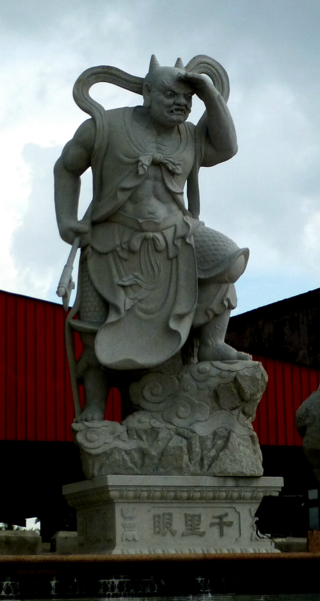
Qianliyan is a Chinese sea and door god. He usually appears with Shunfeng'er as a guardian of the temples of the sea goddess Mazu.
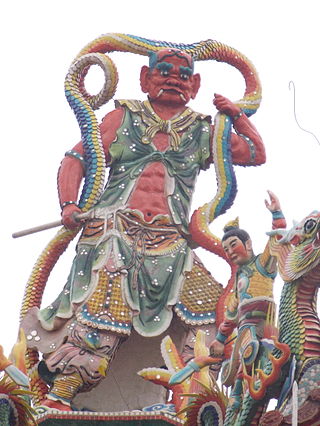
Shunfeng'er is a Chinese sea and door god. He usually appears with Qianliyan as a guardian of the temples of the sea goddess Mazu.

The Tianhou or Mazu Temple is a temple to the Goddess Mazu, the Chinese Goddess of Sea and Patron Deity of fishermen, sailors and any occupations related to sea/ocean. It is located in Xinwu District, Taoyuan City, Taiwan.

The Grand Matsu Temple, also known as the Datianhou or Great Queen of Heaven Temple, is a temple to the Chinese Goddess Mazu, who is the Goddess of Sea and Patron Deity of fishermen, sailors and any occupations related to sea/ocean. The temple is located in the West Central District of Tainan on Taiwan.

The Lukang Tianhou Temple, also known as the Lukang Mazu Temple, is a Chinese temple dedicated to the Chinese Goddess Mazu, the Goddess of Sea and Patron Deity of fishermen, sailors and any occupations related to sea/ocean. The temple is located at 430 Zhongshan Road in Lukang Township, Changhua County, Taiwan. It is one of the island's most famous and popular Mazu temples.

The Penghu Tianhou Temple is a temple dedicated to the sea goddess Mazu located on Zhengyi Street in Magong City, Penghu, Taiwan. It is usually considered the oldest Mazu temple in Taiwan and, despite differences in characters, is the namesake of the surrounding city of Magong. It is open from 7:00 am to 5:30 pm daily.

The Zhonggang Cihyu Temple is a Chinese temple dedicated to the Goddess Mazu, who is the Goddess of Sea and Patron Deity of fishermen, sailors and any occupations related to sea/ocean. It is located in Zhunan Township, Miaoli County, Taiwan and is also the oldest Matsu temple in Miaoli county.
Qianliyan Island is an island in the Yellow Sea about 80 kilometers (50 mi) east of Qingdao, Shandong, China. The area around the island is nationally protected by the Chinese government as an important spawning ground for local seafood.
Mount Qianliyan, also known by its Chinese name as Qianliyan Shan, is a mountain on Taiwan Island. It is located in Hualien County and is part of Taiwan's Central Range.